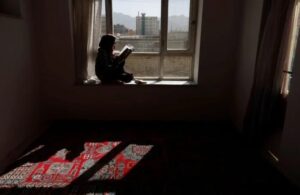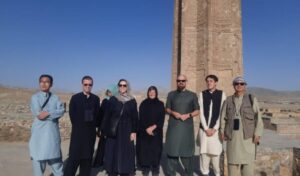KABUL (SW) – Salam Watandar has conducted a survey to check the level of motivation and hope among university students in the wake of the establishment of the Islamic Emirate in Afghanistan.
The survey findings show that after the re-establishment of the Islamic Emirate, 73 percent of students in Afghanistan have experienced a decrease or lack of academic motivation.
Based on the findings, the students’ hope about their professional and academic future are fading away. Up to 55% of students saw their hopes for a career fading and 52% of students lost hope for their academic future.
On the other hand, the findings of the survey about the university teachers showed that 23.7 percent of the university professors under the rule of the Islamic Emirate have no motivations left to teach. In addition, they have said that the available opportunities and level of interest in research and preparation of teaching materials have also dropped.
In this survey, the motivation among students and the level of their attendance in classes from the point of view of their teachers are examined as well in comparison to the past. It showed that 82% of the professors said that students’ level of motivation has decreased.
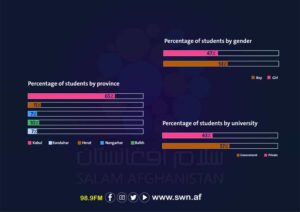
Survey method and data analysis
In this survey, 275 students were interviewed using closed questions in person and random sampling method.
This survey was conducted in a total of 18 universities (9 public and 9 private) Kabul, Nangarhar, Balkh, Kandahar and Herat, where male and female students from private and public universities participated.
It should be noted that in terms of the number of students, since Kabul has the highest number of students among the provinces of the country, up to 65% of the participants are from here while the rest are from the 4 other provinces (Herat, Nangarhar, Kandahar, Balkh).
The method of collecting information and analyzing the data of this survey is quantitative because all of the questions are closed.
The level of academic motivation of students
The findings of Salam Watandar survey show that among the 275 students who participated in this survey, many students’ academic motivation has decreased or they have no motivation left to study. Among these, 55% of the students said that after the rule of the Islamic Emirate, their motivation to study has decreased, and another 18% said that they have no motivation left to study.
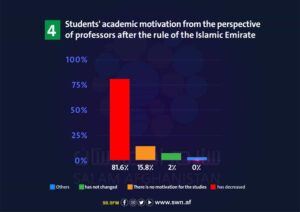
In addition, 17% of students said that their academic motivation has not changed, and only 10% of students reported that their motivation increased after the rule of the Islamic Emirate.
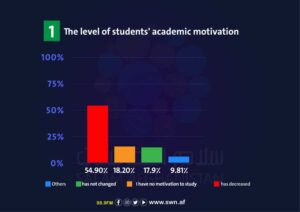
The results of this survey by separating private and public universities show that the level of motivation to study among students of private universities has decreased by 11% more than that of public universities.
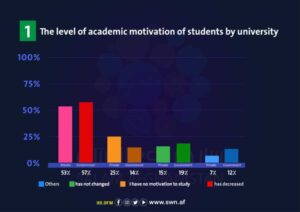
On the other hand, the results of the gender-segregated survey show that there is a small percentage difference between girls and boys in the reduction of study motivation with the boys facing more drop of motivation level than the girls.
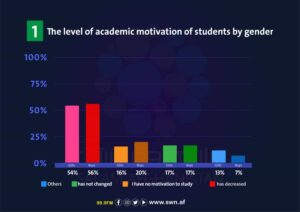
Salam Watandar’s survey on the level of academic motivation among students after the rule of the Islamic Emirate in the capital city and the provinces shows that there is a small percentage of difference – the students in the provinces are less motivated to study with the rise to power of the Islamic Emirate.
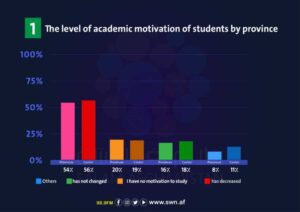
The level of students’ hopes for an academic future
The results of the survey on the level of students’ hope for their academic future show that the hope of 77% of students has been damaged, among them 52% of the students’ hope for their educational future has decreased and the other 25% have no hope left for their educational future.
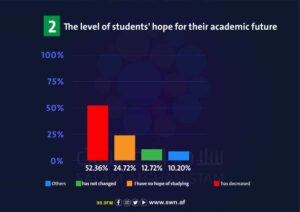
Meanwhile, 13% of students said that their hopes for the future of education has not changed after the rule of the Islamic Emirate, and another 10% said that their hope have increased.
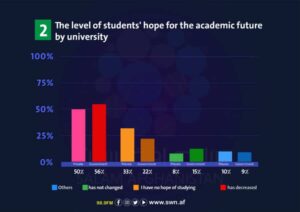
The level of hope for the academic future by among students of the public and private universities shows that the level of hopelessness among students in private universities is 11% higher than in public universities.
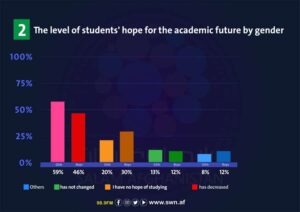
On the other hand, the findings by gender show that the level of hope for the academic future among girls has decreased by 13% more than that of the boys.
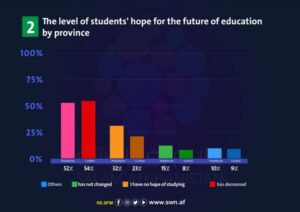
According to the findings of Salam Watandar, the level of hopelessness among students in the provinces is higher than in the country’s capital, Kabul.
The degree of students’ hope for the future of jobs
The findings of Salam Watandar show that 75% of students are affected by the current situation. It showed that with the rule of the Islamic Emirate, 44% of the students said they have no hopes of getting a job, and the another 31% said their hopes have also faded away.
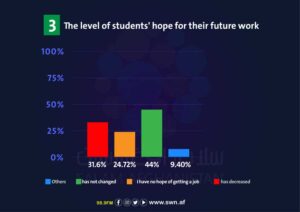
Another 15% of the students in this survey said that their hopes for the future job has not changed, and another 9% said that their hope for jobs increased after the rule of the Islamic Emirate.
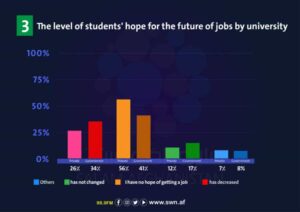
The results of the survey by also indicated that the level of disappointment in getting a job among the students of private universities is 15% higher compared to public universities.
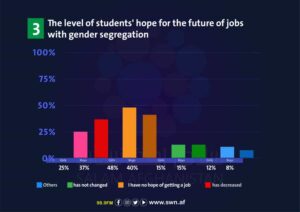
Based on the gender breakdown, in relation to the level of hope for the future of work, 48% of girls and 40% of boys said that they have no hopes left. Meanwhile, 37% of boys and 25% of girls said that their hope has somehow decreased compared to the past.

The level of students’ hope for their future after the rule of the Islamic Emirate has decreased in the provinces more prominently than in Kabul.
Findings of the survey on university professors
In this survey, 38 private and public university professors have been interviewed. Some 66% of the interviewees are male and 34% are female.
About 50% of the interviewees are from private universities and the other 50% are from public universities.
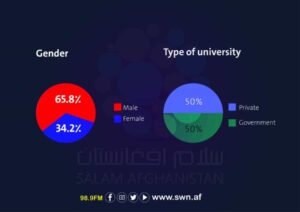
The motivation of university professors to teach
In this survey, 56 percent of professors said that with the return to power of the Islamic Emirate, their motivation to teach has changed. 23.7% of the professors said that they have no motivations left to teach and 31.6% said that their motivation has decreased.
On the other hand, the motivation to teach has not changed among 42% of professors. Only 2% of professors said that with the rule of the Islamic Emirate, their motivation to teach has increased.
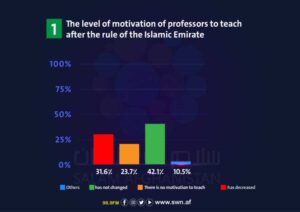
The level of professors’ interest in research and preparation of teaching
According to the survey, the level of interest of 63% of professors in researching and preparing teaching materials in the country’s universities has been damaged by the rule of the Islamic Emirate. It showed that the interest of 39.5% teachers has decreased and the other 24% have no interest left in preparing and researching teaching materials.
Up to 26% of university professors said that their level of interest has not changed with the rule of the Islamic Emirate, and another 10.5% said that their interest in preparing teaching materials and research has increased.
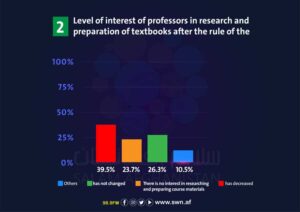
Opportunities and the conditions for professors to research and prepare course materials
Some 74% of the professors said that with the rule of the Islamic Emirate in the country, the context and conditions are not supportive for them to prepare course materials and research in the country’s universities. Among them, 24% said that the opportunities and conditions are not favourable for them at all, and another 50% reported that the opportunities are decreasing.
At least 18% of the professors said that the opportunities and conditions have not changed, and another 8% said that the opportunities and conditions for preparing teaching materials and research have increased after the rule of the Islamic Emirate.
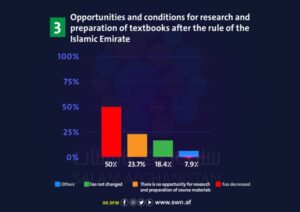
The level of motivation among students from the teachers’ point of view
In this survey, 98 percent of professors said that their motivation has been damaged by the rule of the Islamic Emirate. Some 81.6% reported a decrease in motivation and another 15.8% reported a lack of study motivation among students. Only 2% of professors said that with the rule of the Islamic Emirate in the country, the level of academic motivation among students has not changed.
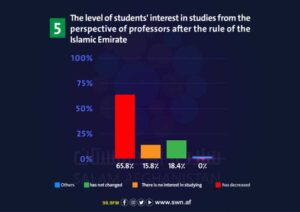
The level of students’ interest in the studies from the teachers’ point of view
The professors who participated in the survey said that students’ interest in studying has decreased or completely disappeared after the rule of the Islamic Emirate. At least 66% of all professors believe that students’ interest has decreased, and another 16% said that students have no interest in lessons. Another 18 percent said that their level of interest has not changed with the rule of the Islamic Emirate. No professor has confirmed the increasing interest of students.
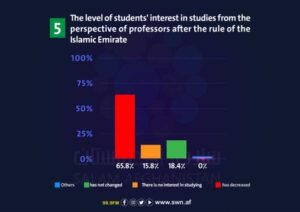
The level of reading among students from the teachers’ point of view
At least 71% of professors said that the level of studying among students has decreased, and another 11% said that students do not study at all. Only 18% also said that with the rule of the Islamic Emirate, the amount of studying among students has not changed.
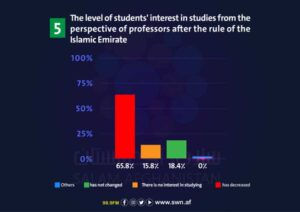
The level of attendance of students from the teachers’ point of view
At least 71% of the professors participating in the survey said that the attendance of students in classes has decreased, 4% said that their students do not attend classes at all, and another 26% said that the attendance of students has not changed.
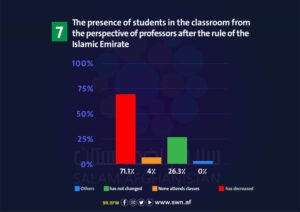
Recommendations
Salam Watandar recommends to the Islamic Emirate to pave the way for research and preparation of reports on the country’s education landscape so that researchers and reporters can identify the strengths and weaknesses of higher education and draw the attention of the authorities to strengthen it.
Salam Watandar also recommends to the Islamic Emirate authorities that the Ministry of Higher Education should investigate why and how the motivation and the level of hope for the academic and professional future of the students have decreased. It should lead to resolving the issues.
Salam Watandar asks researchers and reporters to conduct research on why and how the motivation and level of hope for the academic and professional future of the country’s students have decreased.
Salam Watandar also recommends to the researchers and reporters to prepare more reports and studies on in the higher education sector, which is actually the backbone of the country, and while attracting attention to strengthen the country’s higher education, underline the value of this key sector.
ENDS

